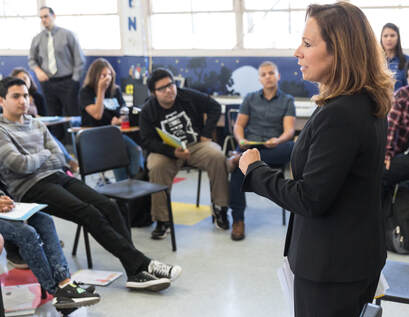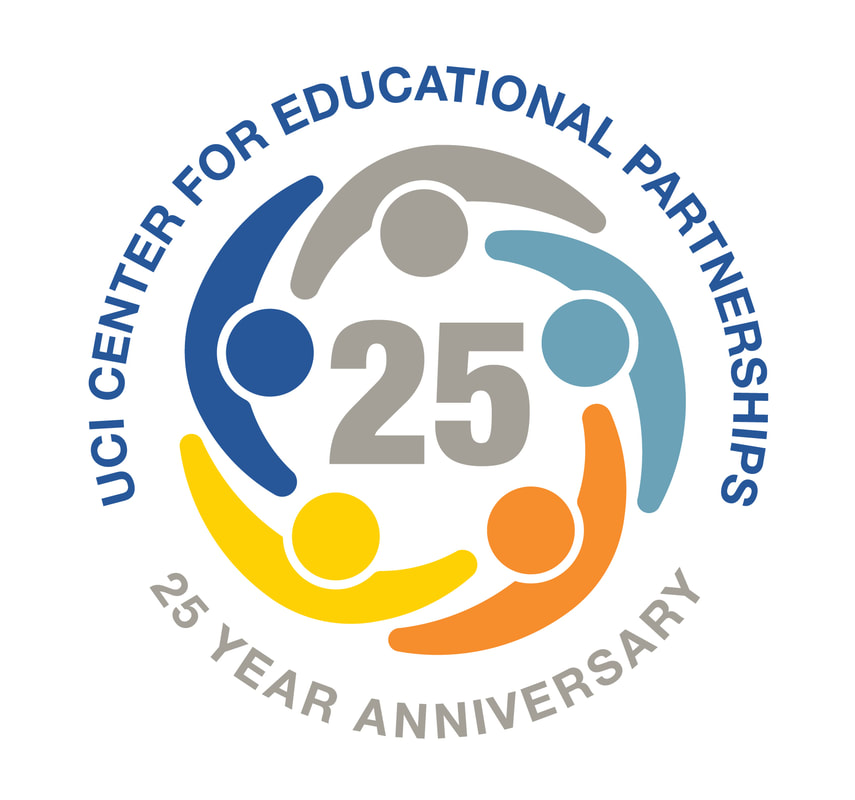AN UNPARALLELED VISION
|
Now in its 25th year, the UCI Center for Educational Partnerships (CFEP) has impacted millions of racially diverse and underserved students, families and educators in communities across Southern California.
CFEP’s programs, partnerships and initiatives target the diverse and unique needs of four separate but interconnected groups: K-12 students, K-12 teachers, community college students looking to transfer, and UCI undergraduates. “For the past quarter century, CFEP has focused on equity and access for underserved students across Southern California,” said Stephanie Reyes-Tuccio, assistant vice chancellor, educational partnerships. “Our innovative partnerships focus on working closely with schools, students, families and entire communities, to prepare students for college and the workforce.” CFEP was formed in 1996 in response to California Proposition 209, which prohibited state governmental institutions from considering race, sex, or ethnicity in several areas, including college admissions. UCI felt it necessary to identify alternate means to ensure the continued enrollment of a diverse and highly qualified student population. |
Key stakeholders at UCI – including founding CFEP Director Juan Francisco Lara, and Manuel Gómez, former vice chancellor, student affairs – organized existing programs and housed them under one roof – CFEP.
CFEP then created deep and meaningful partnerships with school leaders, teachers, students and families, which bucked more superficial strategies across the nation at the time.
“We began a new concept of connecting UCI faculty with entire, specific schools in areas such as Santa Ana, Compton and Anaheim,” Gómez said. “This represented a major shift from information distribution models to academic, faculty-led preparatory models.”
Resources soon followed that led CFEP to create summer academic programs for students – who were oftentimes first-generation – to engage in college experiential learning. With momentum now on its side, CFEP had extraordinary success in bringing K-12 students and teachers together with UCI faculty to strengthen K-12 curricula and teacher’s pedagogical practices.
Advancing through the 21st century, as CFEP became more sophisticated and robust, the center began adding programs that Gómez describes as “intergenerational.” In these, UCI undergraduates began working with K-12 students, UCI graduates worked with undergraduates, and UCI professors worked with all the aforementioned groups.
CFEP then created deep and meaningful partnerships with school leaders, teachers, students and families, which bucked more superficial strategies across the nation at the time.
“We began a new concept of connecting UCI faculty with entire, specific schools in areas such as Santa Ana, Compton and Anaheim,” Gómez said. “This represented a major shift from information distribution models to academic, faculty-led preparatory models.”
Resources soon followed that led CFEP to create summer academic programs for students – who were oftentimes first-generation – to engage in college experiential learning. With momentum now on its side, CFEP had extraordinary success in bringing K-12 students and teachers together with UCI faculty to strengthen K-12 curricula and teacher’s pedagogical practices.
Advancing through the 21st century, as CFEP became more sophisticated and robust, the center began adding programs that Gómez describes as “intergenerational.” In these, UCI undergraduates began working with K-12 students, UCI graduates worked with undergraduates, and UCI professors worked with all the aforementioned groups.
|
“We were looking at how to permanently restructure the curricular experiences for these students so that they better understood the university system,” Gómez said. “We brought them onto campus so that they could experience and feel the campus and feel that it was part of their home.”
CFEP also designed its partnerships with an altruistic tenet in mind, and one that continues to guide its work today: to increase K-12 student achievement and enrollment at any college, not exclusively UCI. “When establishing and cultivating relationships with schools, students and families, we make it clear that we’re here for your children and their best fit, not simply the interests of one university,” Reyes-Tuccio said. “Once you come from that position, the schools and families see you as a true partner.” |
In 1996, when UC campuses were still figuring out how to adapt to life post-Proposition 209, CFEP served as a beacon for others to emulate.
“Juan and Manuel were ahead of the game,” said Dennis Galligani, who previously worked as the assistant vice chancellor, academic affairs for UCI and, at the time of CFEP’s creation, served as the associate vice president, student academic services for the UC Office of the President. “In 1996, the UC Office of the President was looking to enhance the outreach and partnerships that the UCs engaged in. UCI was the leader in those areas, and now it’s spread system-wide.”
While CFEP has been emulated in some fashion at all UC campuses, UCI remains the only such CFEP that focuses on all four of the aforementioned groups: K-12 students, teachers, community college students, and UCI undergraduates.
“Juan and Manuel were ahead of the game,” said Dennis Galligani, who previously worked as the assistant vice chancellor, academic affairs for UCI and, at the time of CFEP’s creation, served as the associate vice president, student academic services for the UC Office of the President. “In 1996, the UC Office of the President was looking to enhance the outreach and partnerships that the UCs engaged in. UCI was the leader in those areas, and now it’s spread system-wide.”
While CFEP has been emulated in some fashion at all UC campuses, UCI remains the only such CFEP that focuses on all four of the aforementioned groups: K-12 students, teachers, community college students, and UCI undergraduates.
/
When establishing and cultivating relationships with schools, students and families, we make it clear that we’re here for your children and their best fit, not simply the interests of one university. Once you come from that position, the schools and families see you as a true partner.
Assistant Vice Chancellor, Educational Partnerships |
“This goes back to the vision of Dr. Lara,” Reyes-Tuccio said. “All these groups of students are not only connected, they are the same students moving through separate systems. If you want to talk about any one group, and you don’t have an understanding and an awareness of what happens earlier or later in their educational journey, then you’re always going to be missing a piece of the puzzle.”
In 2018, to better synergize its work and utilize the world-class research being done with local K-12 schools, CFEP was integrated into the UCI School of Education. “For 25 years, CFEP has forged innovative partnerships, established ground-breaking programs, and led in the transformation of K-12 education in Southern California,” said Richard Arum, dean and professor, UCI School of Education. “Combining CFEP with the world-class research and community at the School of Education, a top-10 public school of education in the nation, allows us to carry out our collective mission of providing every child with an opportunity to achieve their American dream.” |
Through its partnerships, CFEP has had an indelible and incalculable impact on Orange County and the Southern California region.
“The center became a critical part of trying to help Orange County understand the importance of educational equality and of preparing marginalized populations,” Gómez said. “There’s absolutely no doubt that we’ve all been enriched and strengthened as a consequence of getting to know each other better and incorporating sectors that were previously kept out of higher education and American participation. CFEP has been perhaps one of the most important influencers and forces in shaping the new Orange County to understand that this is what our future is about.”
“The center became a critical part of trying to help Orange County understand the importance of educational equality and of preparing marginalized populations,” Gómez said. “There’s absolutely no doubt that we’ve all been enriched and strengthened as a consequence of getting to know each other better and incorporating sectors that were previously kept out of higher education and American participation. CFEP has been perhaps one of the most important influencers and forces in shaping the new Orange County to understand that this is what our future is about.”
We are proud to present the “CFEP: 25 Years of Impact” series. Over the next month, we will share 25 stories in honor of the people, programs and partnerships that have helped impact millions of students, teachers and families over the past quarter century.
Please check back daily to enjoy a new story of impact!
Please check back daily to enjoy a new story of impact!
The preceding story is part of the "CFEP: 25 Years of Impact" series, honoring the people, programs and partnerships that have helped impact millions of students, teachers and families over the past quarter century. View the entire series here.





